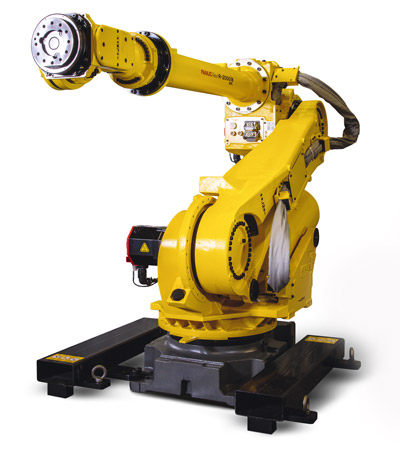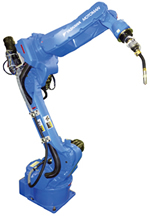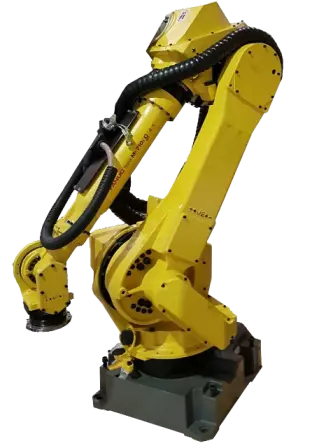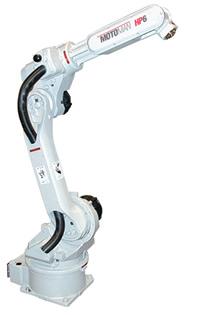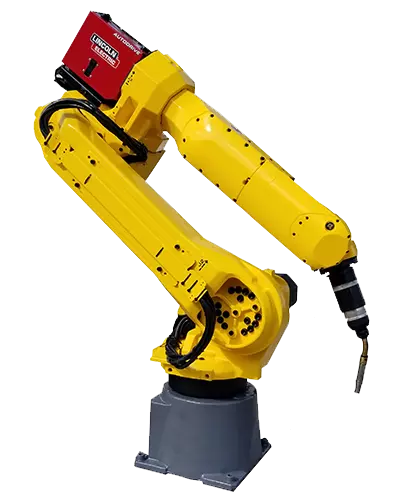Industrial robots have revolutionized manufacturing. Instead of production lines lined with workers or bulky fixed machines, articulated robots and robotic workcells are filling manufacturing floors. Advancements in robotic technology has led to the expansion of robot automation in manufacturing. Robots are more intelligent, autonomous, and versatile allowing them to take on production related tasks that were once only reserved for humans.
Robots excel at highly repetitive, precision-based tasks, making them ideal for most manufacturing processes. They can handle repetitive motions, lifting heavy parts, and harsh work environments. The FANUC M710ic/50 has an IP67 rating making it suitable for tough operation conditions. While the heavy payload of the FANUC R2000ib/165F allows for the moving of large parts without failure.
Robots can automate high volume and low to medium volume operations. Their adaptability allows manufacturers of any size to capitalize on the benefits of robotic automation. Users also do not need to have previous robotic experience as they have become much more user-friendly with simplified programming through either offline or teach pendant methods. Six axis robots may also be guided by a robotic vision system instead of programming or a combination of both for maximum flexibility, autonomy, and accuracy.
Manufacturing Applications
Today’s industrial robots can automate just about any manufacturing application. The early days of robotics featured rigid machines only capable of simple tasks. Through the decades advancements in industrial robots has gradually expanded their scope and today they can be deployed for a wide range of processes. The FANUC Arcmate 120ic is performing automating arc welding while the FANUC R-2000ib/165F is completing automated spot welding and robotic material handling applications. Special robot can be used to automate painting. The FANUC M410ib/700 is performing heavy duty robotic palletizing whereas the ABB 2400/16 being integrated into automated material removal and robotic assembly processes. With the integration of force sensors and vision systems, robots are given the senses of touch and sight for greater adaptability and precision. With vision, a FANUC Lr Mate 200id is able to automatically adjust to part changes without stopping operation.The automotive industry is one of the largest users of industrial robots for manufacturing. Working with large parts, the need for extreme accuracy, and the demand for high quality make factory robots and automotive manufacturers the perfect fit for one another. Other industries automating with robots include the aerospace, electronics, metals, and warehousing industries. Even non-industrial industries such as the pharmaceutical and food industries are deploying cleanroom robots to ensure their products are manufactured in the cleanest and safest method possible. Low payload robots like the ABB 1200-5/.9 and the FANUC LR Mate 200ib come in cleanroom versions.
Reasons to Automate Manufacturing with Robots
Automating manufacturing with robots improves operation efficiency and allows companies to keep up or out perform their competition. More and more manufacturers are turning to robots for the following reasons:- • Cost-Savings - Robots reduce operational costs by eliminating material waste, increasing throughput, and twenty-four-hour operation. There are no salaries or benefits to pay with robots, reducing labor costs. Many of today’s robots are energy efficient and can operate in dim light or hot or cold facilities, lowering utility costs. Purchasing a used robot can realize further cost savings, as the cost of a used robot is far less than that of a new robot.
- • Improve Quality - The accuracy, repeatability, and reliability of robots improves product quality. Robots are guided by programs to ensure all parts produced are uniform and high-quality. Most used FANUC robots for sale have the same or similar repeatability as new.
- • Improve Workforce Issues - In manufacturing there are two issues companies have to deal with: worker safety and high turnover. Robots resolve both of these by taking over dangerous jobs from workers and providing companies with a long-term manufacturing system.
- • Increase Productivity - Robots operate at fast speeds and for long hours, significantly increasing productivity rates. With higher productivity manufactured goods can reach more consumers in less time for potential profit growth.
